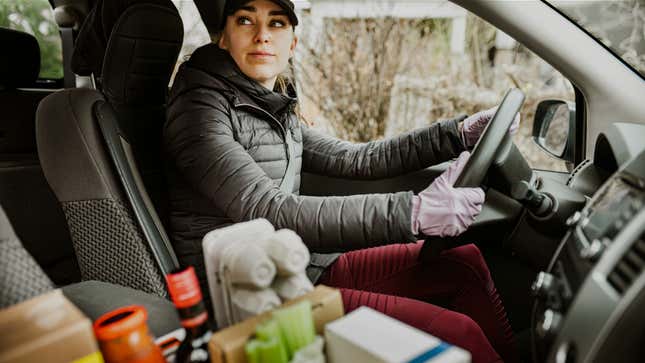
Walmart on Tuesday announced the rollout of a new delivery service called “GoLocal,” which will see the retailer offer its fleet of delivery drivers for smaller businesses looking to get orders out to their customers. GoLocal will be built on Walmart’s quickly growling fleet of delivery drones, driverless vehicles, and gig workers, which the company claims already reaches “nearly 70%” of the population.
“In an era where customers have come to expect speed and reliability, it’s more important than ever for businesses to work with a service provider that understands a merchant’s needs,” Walmart CEO John Furner said a statement.
And Walmart really, really wants to be that provider—even though there’s already plenty of other companies readily filling that role. The ongoing global pandemic has proved there’s a massive profit to be made off the ability to deliver goods of all shapes and sizes straight to anyone’s door. Companies like Uber and DoorDash quickly moved to corner the market for delivery takeout, while Instacart branched out into delivering groceries, makeup, and office supplies. On top of those competitors, there’s always the looming threat of Amazon’s own last-mile delivery platform, Amazon Logistics, which has quietly been beefing up its ranks over the past few years.
Naturally, gig workers got the short end of the stick in this race to deliver all things to all people. One survey detailing the hundreds of delivery drivers zipping across New York City from this past spring found that they were consistently earning below the city’s $15 minimum wage. On average, the survey found, these workers were earning between roughly $6.50 and $7.90 per hour (not counting tips).
Despite the fact that everyone seemed to agree that these workers provided a much-needed social safety net among city residents who were suddenly homebound for months on end, nobody seemed willing to give them a decent living wage.
When drones or autonomous cars aren’t carrying out Walmart’s deliveries, TechCrunch reports the retailer will rely on these same gig workers, too, at least for now. Walmart said that at least at first, purchases would be handled through Walmart’s Spark Driver program that routes people’s Walmart buys to third-party drivers for their eventual delivery. As GoLocal expands, the company plans on moving that responsibility entirely in-house. Earlier this year, for example, Walmart began hiring associates across Northwest Arkansas to handle the company’s fleets of delivery vans—larger vehicles meant to handle purchases too big to fit in a Spark Driver’s personal car.
“We’ve worked hard to develop a reliable last mile delivery program for our customers,” said Tom Ward, a senior VP who handles Last Mile programs at Walmart. “We’ve designed Walmart GoLocal to be customizable for merchants of all sizes and categories so they can focus on doing what they do best, leaving delivery speed and efficiency to us.”
Undoubtedly, countless Walmart customers will, the same way those customers have already been doing with Uber, Dolly, Roadie, and every other platform that’s bubbled up in the delivery space until now. In a world where “innovation” increasingly means cribbing the best features from your competition, Walmart’s slow DoorDashification is all but inevitable.